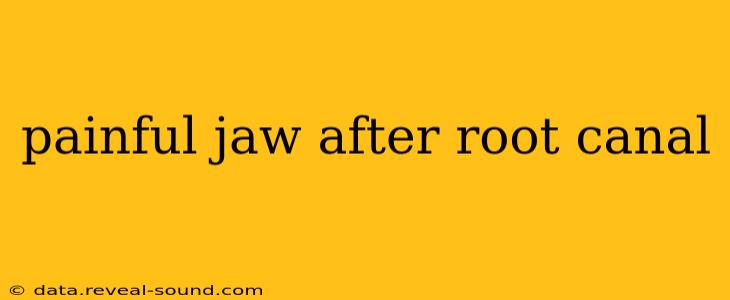A root canal, while designed to save your tooth, can sometimes lead to jaw pain afterward. This isn't uncommon, and understanding the potential causes, effective treatments, and preventative measures can ease your concerns and help you manage any discomfort. This comprehensive guide explores the reasons behind post-root canal jaw pain and offers solutions to help you find relief.
Why Does My Jaw Hurt After a Root Canal?
Post-root canal jaw pain can stem from several factors, often interconnected. It's crucial to understand these to effectively address the issue.
-
Inflammation and Irritation: The root canal procedure, while minimally invasive, involves inflammation. This inflammation can sometimes spread beyond the tooth itself, affecting the surrounding tissues and causing jaw pain. The body's natural healing process can also contribute to this discomfort.
-
Infection: Even after a successful root canal, a lingering infection can persist. This can cause pain, swelling, and discomfort in the jaw. This is less common with proper procedure and post-operative care.
-
TMJ (Temporomandibular Joint) Issues: The temporomandibular joint connects your jaw to your skull. Stress, grinding teeth (bruxism), or even the procedure itself can exacerbate pre-existing TMJ problems, leading to jaw pain. The pressure or discomfort from the procedure can sometimes trigger this.
-
Sinus Infection: The proximity of the upper molars to the sinuses means that a sinus infection can sometimes manifest as jaw pain, especially if there's any lingering inflammation from the root canal. While less directly related, it's an important consideration.
-
Muscle Spasms: The jaw muscles can spasm as a response to inflammation or irritation, leading to intense pain and discomfort. This can be particularly troublesome if you clench or grind your teeth.
How Long Does Jaw Pain After a Root Canal Last?
The duration of jaw pain following a root canal varies greatly depending on the individual and underlying causes. Mild discomfort often subsides within a few days, with over-the-counter pain relievers offering sufficient relief. However, persistent or worsening pain requires immediate consultation with your dentist. In some cases, the pain may last for several weeks, while in others, it might resolve quickly. This wide range highlights the importance of seeking professional help if the pain doesn't improve or worsens.
What Can I Do to Relieve Jaw Pain After a Root Canal?
Several at-home remedies can help alleviate mild jaw pain:
-
Over-the-Counter Pain Relievers: Ibuprofen or acetaminophen can effectively manage mild to moderate pain. Always follow the recommended dosage.
-
Cold Compress: Applying a cold compress to the affected area can reduce swelling and inflammation. Use a clean cloth or ice pack wrapped in a towel, applying for 15-20 minutes at a time.
-
Rest: Avoid chewing on the affected side and rest your jaw as much as possible. This minimizes strain on the jaw muscles and promotes healing.
-
Soft Food Diet: Stick to a soft food diet to minimize pressure on the tooth and jaw. Soups, yogurt, and mashed potatoes are good options.
-
Gentle Jaw Exercises: Your dentist may recommend specific gentle jaw exercises to improve range of motion and alleviate muscle tension.
When Should I See a Dentist About Jaw Pain After a Root Canal?
Severe, persistent, or worsening jaw pain following a root canal warrants immediate dental attention. Don't delay seeking professional help if you experience:
- Intense pain that doesn't respond to over-the-counter pain relievers.
- Swelling or redness around the affected area.
- Fever or other signs of infection.
- Difficulty opening or closing your mouth.
- Pain lasting longer than a week or two.
Can a Root Canal Cause Long-Term Jaw Problems?
While rare, prolonged or unresolved inflammation from a root canal can potentially contribute to long-term jaw problems. However, most instances of jaw pain after a root canal resolve with proper treatment and care. Timely intervention by your dentist is key to preventing any long-term complications.
How Can I Prevent Jaw Pain After a Root Canal?
Following your dentist's post-operative instructions meticulously is crucial to minimize the risk of jaw pain. This includes:
- Taking prescribed medications as directed.
- Maintaining good oral hygiene.
- Following dietary recommendations.
- Avoiding strenuous activities that could stress the jaw.
- Addressing any underlying TMJ issues before the procedure.
By understanding the potential causes of jaw pain after a root canal and promptly addressing any concerns with your dentist, you can ensure a smoother recovery and minimize the discomfort. Remember, your dentist is your best resource for personalized advice and treatment.
